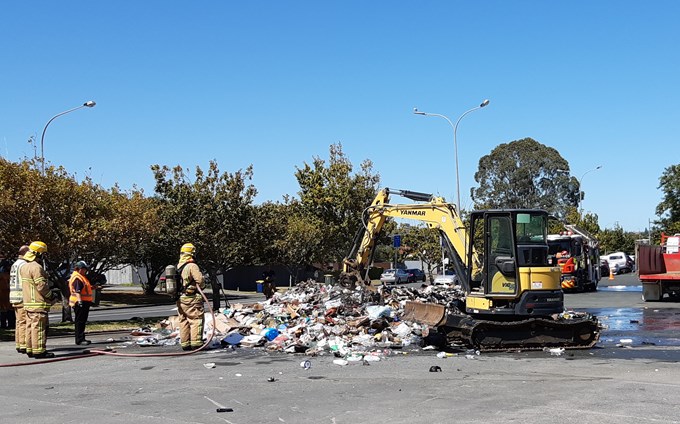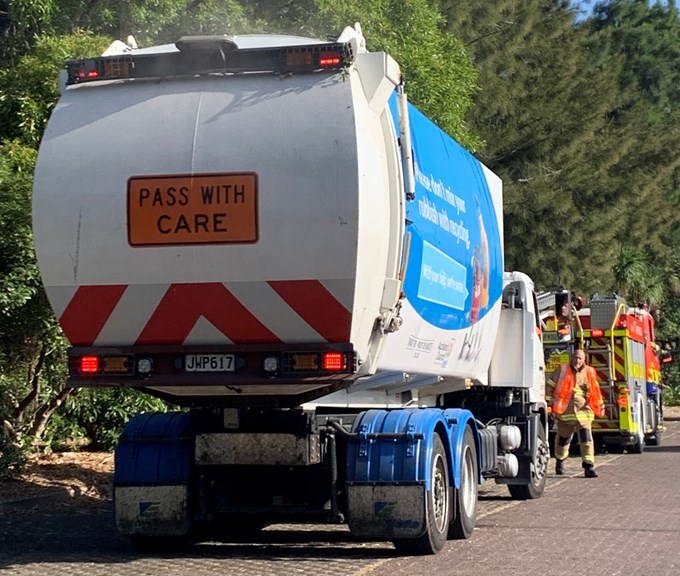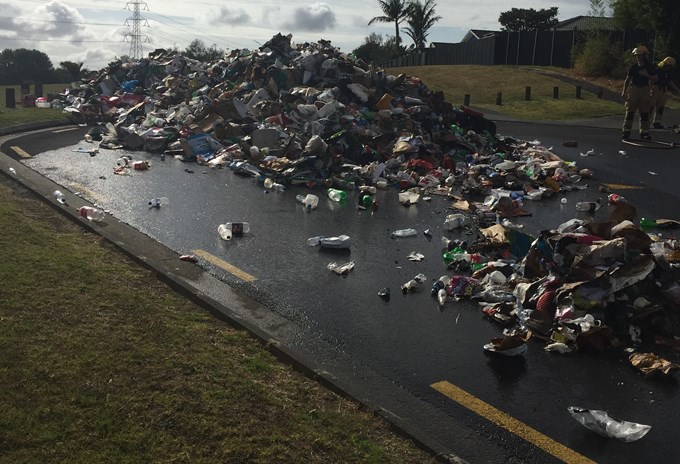BREAKING NEWS: As this story was about to be published, we received notification of a third recycling truck fire in Sunnynook. Fire and Emergency New Zealand have been at the scene. The cause of the blaze is, as yet, unknown. Aucklanders cautioned to take care with what they put in their recycling bins to avoid the risk of serious harm.
Gas cooker canisters, lighter fluid cans, or a motor vehicle cambelt wrapped around a packer mechanism are the probable culprits in another recycling truck fire last week. Auckland Council is again warning Aucklanders of the dangers truck blazes pose to waste contractor employees, nearby traffic, and passing pedestrians.
Emergency services were notified last Tuesday after a collection truck operator noticed smoke coming from the hopper. Fire officers quickly directed the truck to a nearby cul-de-sac in Ōtara where the small load was dumped out and the blaze fully extinguished.
“Hazardous waste, including flammable and combustible items, should never be placed in kerbside rubbish and recycling bins,” says Councillor Richard Hills, Chair of the Environment and Climate Change Committee. “Because of the compacting equipment in collection truck hoppers, there is a significant chance of a fire occurring when items are crushed by the compactor.”
Councillor Hills says that it has been fortunate that a more serious incident has not occurred, thanks to the vigilance of truck operators, rigid safety protocols that are in place if a fire occurs, and the rapid responses from Fire and Emergency New Zealand (FENZ).
The Ōtara incident followed in the wake of a truck fire the previous week in Lynfield when a full load of recyclables caught fire and had to be emptied out in a nearby parking lot at Margaret Griffin Park so that firefighters could gain control of the smoking debris. The cause of the blaze was not able to be isolated but around six tonnes of recyclable materials had to be uplifted from the site and trucked to landfill.

“Recycling truck fires could cause serious harm to our staff, contractors or the public, and they are always a costly exercise, both financially and environmentally,” says Councillor Hills.
“In addition to emergency services being called out, there’s disruption to collection services, the cost of cleaning up the contaminated materials, and then the additional cost of materials having to be disposed of in landfill, instead of being recycled. Then, the recycling truck needs to go through a full service and check before it can be deployed back on the streets.”
How to recycle right
The things that should go in our kerbside recycling bins are household containers from our kitchen, bathroom, and laundry made from plastic, glass, steel, and aluminium, as well as paper and cardboard.
Trying to ‘wishcycle’ unwanted items in your kerbside recycling bin like electronic gadgets, motor parts, and building and construction items to recover the potentially valuable materials can have unintended, and potentially dangerous consequences.

If unsure, Aucklanders can play council's fun online Recycle Right game to find out whether items should go in the rubbish bin or recycling bin.
Things that should never go in your kerbside rubbish or recycling bins
Certain types of hazardous waste are not suitable for our kerbside rubbish or recycling bins. Auckland Council advises that anything that is flammable, toxic, explosive, corrosive, or radioactive, should be taken to transfer stations that specialise in managing hazardous waste. Common examples of hazardous waste include most chemicals, paint, acid, gas cooker aerosol canisters, gas cylinders, and many battery types, including lead, mercury, nickel, car, and zinc-based batteries. These can be taken to an authorised battery recycler.
Lithium-based batteries used to power items such as mobile/cell phones, hearing aids, power banks, laptops, electric vehicles, power tools, and vapers are also hazardous items, which cannot be put in our rubbish or recycling bins. These outlets can help you to safely recycle or dispose of them.
It’s easy to get it right
Auckland Council has a useful online tool that explains how to safely dispose of unwanted items if people are unsure as to whether an item can be recycled or not.
“Making the effort to recycle right not only keeps waste out of landfill and protects our environment, it also keeps the people working to manage and minimise our waste safe,” says Councillor Hills.




